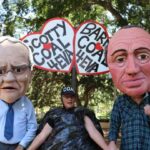Albanese Goads Greens on Climate, Yet the Party Is Offering the People’s Targets

Prime minister Anthony Albanese claimed on Tuesday that the actions of the Greens “led to a decade of inaction and delay and denial” on climate, while that party, now holding balance of power in the Senate, is prioritising the targets needed as the globe faces the escalating climate crisis.
On taking the top office, Albanese promised to “end the climate wars” with much higher emissions targets than previous Coalition governments, however while the policy he’s offering does appease expectations in the international political arena, it’s not what’s needed to allay extreme weather.
Labor’s target of 43 percent emissions reduction on 2005 levels by 2030 does indicate significant improvement when compared to the Coalition’s decade-old aim of 26 to 28 percent, but the Greens are pushing for a 75 percent drop, in line with the recommendations of the Climate Council.
The new PM is attempting to publicly cast the Greens as a climate culprit in order to push the party into supporting the legislating of his 43 percent target, as the Coalition won’t support the Labor bill and, with the minor party now holding 12 Senate seats, he needs its support to see it through.
The greenslide happened
Speaking on 12 July, Albanese pointed to “what they did in 2009” as he referred to why he considers the Greens are to blame for the nation’s climate inaction, as he alluded to the party having voted against the Rudd government’s carbon reduction scheme as it wasn’t ambitious enough.
But to assert that the Greens Party now pushing for the sort of emissions targets needed to slow the heating of the planet is somehow jeopardising the government’s more modest climate policy would be to ignore the significant numbers who recently turned away from the majors at the election.
As Greens leader Adam Bandt told Sydney Criminal Lawyers in June, “Labor needs to listen to the science and the electorate on climate, both are clear on the first step, which is to stop pouring fuel on the fire and stop opening new coal and gas mines.”
The recent election was labelled a “greenslide” due to the numbers the Greens picked up in the Senate and the four lower house seats the minor party gained, but this outcome further involved the election of 10 teal independents into the lower house, campaigning on stronger action on climate.
Bandt added that his party “want to work with Labor to make them go further and faster on climate change”. And he’s repeatedly raised the point that Labor’s climate policy continues to allow for the greenlighting of 114 new coal and gas mines.
The wanted diplomacy
But it’s not just a large portion of the constituency calling for greater climate action than what Labor has on the table, in the lead up to this week’s Pacific Islands Forum in Fiji, the leaders of island nations underscored that what they want is Australia to halt any new coal and gas projects.
Pacific nations have said they’re encouraged by the Albanese government coming to power, as well as its prioritisation of diplomatic relations in the South Pacific, but for them, the bottom line is immediate robust action on climate, as their nations are being engulfed by rising sea levels.







